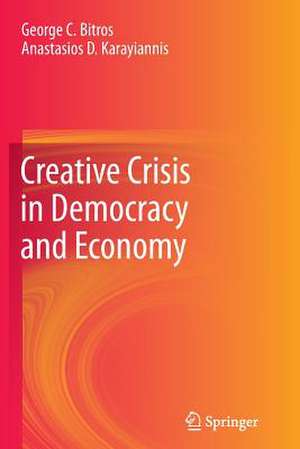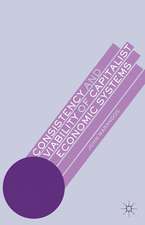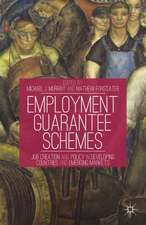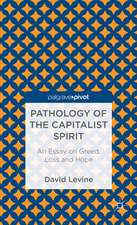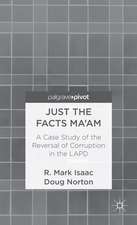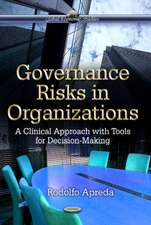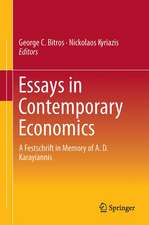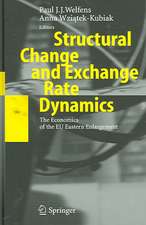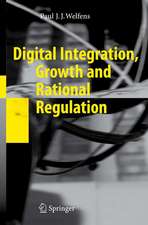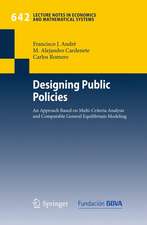Creative Crisis in Democracy and Economy
Autor George C. Bitros, Anastasios D. Karayiannisen Limba Engleză Paperback – 6 mar 2015
| Toate formatele și edițiile | Preț | Express |
|---|---|---|
| Paperback (1) | 784.32 lei 38-44 zile | |
| Springer Berlin, Heidelberg – 6 mar 2015 | 784.32 lei 38-44 zile | |
| Hardback (1) | 951.77 lei 6-8 săpt. | |
| Springer Berlin, Heidelberg – feb 2013 | 951.77 lei 6-8 săpt. |
Preț: 784.32 lei
Preț vechi: 1031.99 lei
-24% Nou
Puncte Express: 1176
Preț estimativ în valută:
150.13€ • 163.13$ • 126.19£
150.13€ • 163.13$ • 126.19£
Carte tipărită la comandă
Livrare economică 17-23 aprilie
Preluare comenzi: 021 569.72.76
Specificații
ISBN-13: 9783642437205
ISBN-10: 3642437206
Pagini: 292
Ilustrații: X, 279 p. 10 illus.
Dimensiuni: 155 x 235 x 15 mm
Greutate: 0.41 kg
Ediția:2013
Editura: Springer Berlin, Heidelberg
Colecția Springer
Locul publicării:Berlin, Heidelberg, Germany
ISBN-10: 3642437206
Pagini: 292
Ilustrații: X, 279 p. 10 illus.
Dimensiuni: 155 x 235 x 15 mm
Greutate: 0.41 kg
Ediția:2013
Editura: Springer Berlin, Heidelberg
Colecția Springer
Locul publicării:Berlin, Heidelberg, Germany
Cuprins
The Athenian Democray.- The Classical Democracy.- The Contemporary Democracy.- A Digression on Social Democracy.- The New Classical Democracy.- The Place of Democracy in the World and Globalization.- Democracy, Free Market Economy and European Unification.- Democracy in the Future and the New Welfare State.- The Case of Contemporary Greece.
Notă biografică
George C. Bitros is Professor of Economics, Emeritus, Department of Economics, Athens University of Economics and Business. He obtained his Ph.D. in economics from New York University in 1972 and worked as Senior Research Associate in the Research Department of the Bank of Greece and as Professor of Economics at the Athens University of Economics and Business. He has published extensively in distinguished scholarly journals, and has authored and co-edited books with international and Greek publishers. He has served as research associate in the National Bureau of Economic Research (USA) and has held advisory posts in government, government commissions and major corporations. He continues to serve as referee for international and Greek journals.
Anastasios D. Karayiannis was Professor of Economics in the Department of Economics of the University of Piraeus. His research interests spanned several fields of economics, including the history of Economic thought, the Methodology of Economics and Entrepreneurship. His contributions to these fields comprise 11 books in Greek language and over 50 papers published in highly esteemed international journals. Additionally, in recent years, he contributed numerous reviews and comments in Greek periodicals and newspapers.
Anastasios D. Karayiannis was Professor of Economics in the Department of Economics of the University of Piraeus. His research interests spanned several fields of economics, including the history of Economic thought, the Methodology of Economics and Entrepreneurship. His contributions to these fields comprise 11 books in Greek language and over 50 papers published in highly esteemed international journals. Additionally, in recent years, he contributed numerous reviews and comments in Greek periodicals and newspapers.
Textul de pe ultima copertă
Developments across the millennia suggest that, even though democracies and free market economies are continuously challenged by crises and disturbances, such as natural disasters, wars, or technological revolutions, in the countries where they take roots civil liberties deepen and per capita prosperity increases. To substantiate this claim analytically, the authors emphasize the principles that make free markets a sine qua non condition for democracy and study the nature of the relationship between free market institutions and economic growth. By examining the operating principles, outcomes and challenges experienced by contemporary democracies, many lessons are drawn with regard to how governments should act in order to avoid the pitfalls inherently associated with representative democracy. To illustrate the dangers of deviating from these principles, the authors apply their findings to the Greek democracy and economy since the Second World War.
Caracteristici
Combines philosophy, economics, politics, and other related fields
Makes a case for a representative democracy with free market economy and a small state
Contemporary Greece serves as illustrating case study
Includes supplementary material: sn.pub/extras
Makes a case for a representative democracy with free market economy and a small state
Contemporary Greece serves as illustrating case study
Includes supplementary material: sn.pub/extras
